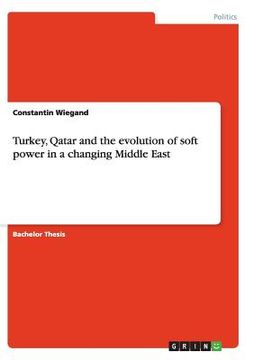Turkey, Qatar and the evolution of soft power in a changing Middle East (en Inglés)
Reseña del libro "Turkey, Qatar and the evolution of soft power in a changing Middle East (en Inglés)"
Bachelor Thesis from the year 2013 in the subject Politics - Region: Near East, Near Orient, grade: 1,0, University of Bath, language: English, abstract: Conventionally, politicians and diplomats defined power as the control over a territory and its population, the possession of natural resources, economic size, military force, and internal political stability. Today, this emphasis on using military force to exert control over a territory, its population and its natural resources which marked earlier eras is losing significance. Factors such as technology, education and economic growth are becoming more important in the international struggle for power. As the great powers of today are less able to use their traditional power resources to achieve their goals, private actors and small states have become more powerful. Joseph Nye identified five trends which contributed to this diffusion of power: economic interdependence, transnational actors, nationalism in weak states, the spread of technology and changing political issues. He argued that these trends suggest a second, more attractive way of exercising power than traditional means, and called this aspect of power "co-optive" or "soft" power. Since the end of the Cold War, the concept of soft power has been used extensively in discussions about US foreign policy and has more recently also been used to describe China's foreign policy. But far less attention has been given to how this term can be used in other cultural contexts to describe intra-regional politics, such as in the Middle East. Turkey and Qatar are two countries that try to navigate through this dangerous region in a different way. But what they have in common is that they both managed to improve their reputation and increase their visibility in the past decade. This has translated this into increased policy impact on the regional and global stage. Is the concept of soft power useful to explain the increased power of attraction that emanates from these

